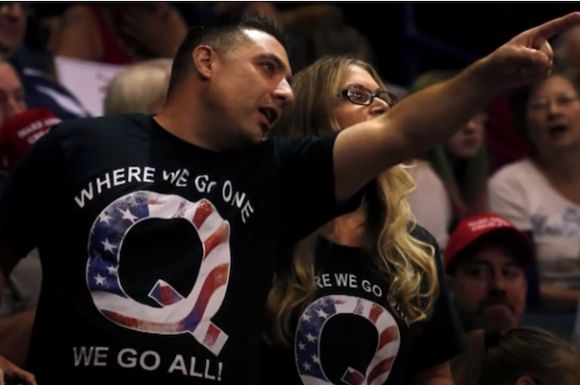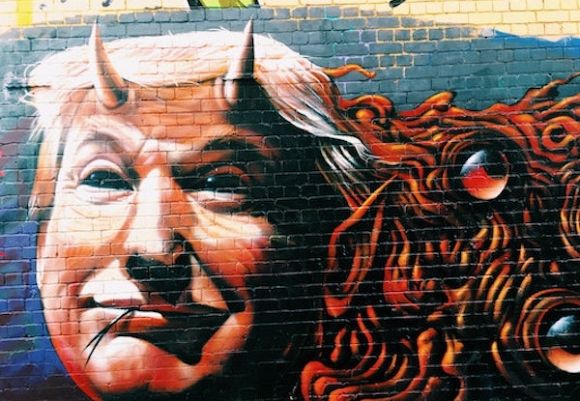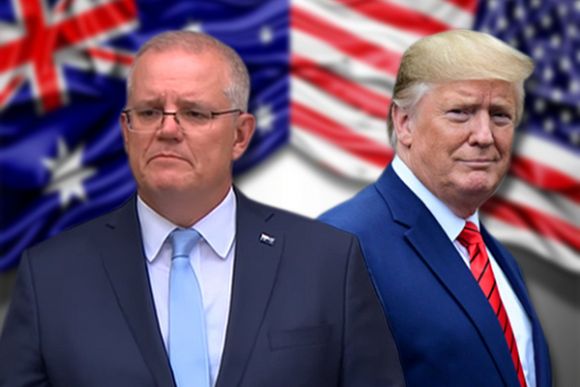Trump's supporters have fallen for his narcissistic, sociopathic traits — voting for him because they believe he is a hero and the only person equipped to save America, writes Dr A L Jones.
WHAT IS IT with Donald Trump, QAnon (Q) and 74 million voters?
It’s lurve.
Many supporters basically worship Trump:
‘When I hear him talk about life, it’s not just a social issue, it’s a "God-says-it’s-wrong" issue’.
Americans voted for Trump in the 2016 and 2020 U.S. Presidential Elections for myriad reasons, but research has thrown up the standout one: the cheek-by-jowl fit between Trump and his followers, of shared prejudice, aversion, desire and fear — just what QAnon thrives on as well.
Trump’s supporters love him, many to the point of being willing to fight and die for him. Maybe it’s an American thing. Why would everyday citizens be willing to sacrifice all for their leader?
The following five premises, though overly simplified, are the guts of the story:
- By clinical definition, it appears Trump has a narcissistic-sociopathic disorder. Such people can be charismatic and attractive but often lie and con in their quest for total power and do not care about other people.
- Trump’s followers have literally fallen in love with his narcissistic traits.
- Trump uses the age-old myth of the hero’s journey to seduce followers: Trump is the only hero who can save America from the barbarians. His supporters buy it because they are infatuated with him.
- Above all else, most Trump followers want to feel safe — they see threat where others see none and are driven to protect themselves. For many, deterrence of outside threats and protection of insiders – whether by Q, segregated communities and border walls – are their raison d'être.
- Trump followers tend to be politically conservative, meaning, on average, they are not the best at processing complex ideas. They’re unlikely to grasp progressivist reasoning. And research says many are drawn to simplistic, all-or-nothing solutions and authoritarian ideologies – such as Q – that, in turn, fuel prejudice.
Narcissistic sociopaths
While clinical narcissists comprise 6% of the American population and clinical sociopaths, 4%, narcissistic sociopaths (or malignant narcissists) comprise less than 1%. This relatively low number is fortunate, as narcissistic sociopaths want total power and will stop at nothing to get it.
If you’re unlucky enough to meet one, the thing to do is protect yourself and refrain from ceding power to them. Unfortunately, this seemingly easily grasped concept – namely, don’t vote for sociopaths – is among the least practised throughout history. Life as we have known it is imperilled because too many of us have regularly handed sociopaths – whether in business or government – power on a plate.
How shall we know them? Mercurial as they appear, narcissistic sociopaths follow a consistent pattern of behaviour. They habitually lie, cheat, demean and blame others, and don’t manage their emotions; they are adversarial, may violate laws and show egregious behaviours that almost no one else does. They may enter politics for the express purpose of stealing from the public purse and engaging in large-scale swindling.
Narcissistic sociopaths exacerbate, rather than manage, conflict. They feel at war with the world and project this onto others, seeing others as at war with them. They are driven to control or remove their perceived enemies. They are driven to dominate, lack remorse, never reflect on their own behaviour – hence, never change – and are likely impossible to treat.
According to author, therapist and lawyer Bill Eddy:
HCPs [High-Conflict Politicians] are profoundly attracted to the glory and attention, vindication and validation of being elected — and to gaining, having, and exercising absolute power. In particular, they relish having the power to publicly blame, punish, or destroy anyone they believe is their enemy. They love the fight — the adversarial process. But, above all, they want to win and they want to dominate — and they want everyone to know that they won, and to see them as the absolute top of the heap. They want to be the strongman. The person no one challenges. The person everybody loves — or at least obeys or bows down to. The person with the power and the glory. And they are driven to do everything they can to make this happen, regardless of the consequences to others or even to themselves.
Narcissistic sociopaths love conflict-driven media, such as Fox News and Sky News, which seems to require only spectacle and advertisers, not skills. On air, Trump behaves badly, tells lies and spins stories featuring himself as the hero. His followers know it’s spin and love him for it. Nearly half of all adults who consume conservative media view Trump favourably. Yes, this is truly about love.
Why many of us fall in love with sociopaths
On the whole, Trump’s followers have fallen for his narcissistic traits. They are in love with – this is hard to say – the charming, attractive, charismatic, seductive and grandiose traits of "the Donald". As for his sociopathic traits – ruthlessness, heartlessness, deceitfulness, paranoia, authoritarianism, sadism and lack of empathy and conscience – well, you know… it’s love. You probably know someone…
As Bill Eddy maintains:
‘...our emotional attractions operate outside of our conscious radar. We simply fall in love.'
Narcissistic sociopaths intuitively understand this and habitually seduce people by their emotional expressiveness and stories but don’t actually care about those they seduce. Trump does not and indeed cannot give a hoot for his followers. It’s all about him.
The sociopath's "hero’s journey"
The central myth Trump pushes to his base is that he is the only person equipped to save America from the barbarians. He blames former leaders for letting in enough criminals, freeloaders, non-Americans and heretics to outnumber "real" Americans.
True to form, Trump repeatedly returns to the threats posed by outsiders and an associated need for security. He invents enemies and false crises to portray himself as the only one who can fix them. Devoid of leadership skills, this is Trump’s selling point to the electorate.
Always at the heart of the hero myth is an evil villain causing an abominable crisis (think, government 'Pizzagate' cannibalistic paedophile ring) that requires a superhero – in this case, "the Donald" – to solve.
Trump’s supporters love him for what they see as his independence and courage, saying:
"He’s going to say what he thinks, whether he offends anybody or not... Nobody owns him… he’s his own man... He’s not political. He’s rough around the edges but tells it like it is... I thought, all right, we got a guy here who’s going to whoop some butt on these politicians."
Obsessed with security
In 2020, 83% of Republicans said the American way of life was under threat. And research on the 2016 election showed that the main reason Trump’s white supporters voted for him was that they shared his fears and prejudices. The disproportionately pro-Trump demographic was white, male, older and less educated. It wanted aggressive leaders to "crush evil" and "get rid of the rotten apples" who disturb the status quo.
Today’s Trump followers believe in his heroic ability to solve the current crisis – the "stealing" of the election – and make them feel safe again.
Above all else, most Trump supporters seek security, saying things like:
“I feel much safer with him in office. We need to secure our borders”.
Such followers often perceive neutral events as threatening and believe it is their noble task to protect insiders. Insiders are defined as those who belong to the dominant race, religion and language group — people like them.
Hence, everyone else is an outsider and, by definition, a threat — the more dangerous the threat, the more rewarding the act of guardianship. Above all, these Trump followers believe that safety requires insiders to remain strong (including armed) and unified.
Such supporters believe Trump will:
“... make us feel safe. We need to feel safe in this country…There’s a great divide between the races.”
Many Trump supporters love him for putting insiders first and outsiders last.
Indeed, pro-Trump comments reflect this:
“If Trump simply secures the border and protects us from foreign and domestic enemies… He’s gonna take care of us first and worry about the rest of the world later”.
Trump’s base generally views immigration, welfare spending and foreign aid as benefiting outsiders, hence, by definition, weakening insider culture. The former U.S. president personifies his supporters’ vigilance and aversion to vulnerability. The extreme version of the Trump supporter is the survivalist; he doesn’t trust governments to treat threats seriously and he opposes government regulation because it makes him less secure.
While Trump’s protracted attempt to overturn the 2020 election turned off most Americans, his supporters loved him in 2016 for taking drastic action to stand up for 'the last chance to stop America’s decline'.
Trump followers’ conservative mindset
Trump’s supporters tend to be conservative in their thinking. But, as described elsewhere, conservative and progressivist brains differ in ways that make conservatives relatively poor at analysing complex ideas and, hence, evidence resistant. As a result, Trump supporters, on average, are under-equipped to weigh the evidence that enables progressivists to see Trump for the charlatan he is.
His followers are unlikely to grasp the complex arguments of detractors. And because they don’t trust the media to tell them the truth, they have no option but to go by gut instinct. And being in love arouses a lot of gut instinct.
What to do about the possibility of a Hitler-like resurrection of Trump via Q and the real potential of authoritarian rule in America?
In the short term, ordinary Americans must organise and fight – as well as or better than the Right has always done – for local progressivist leaders. You can keep your democratic principles, but please get rid of your accursed "niceness". And, globally, everyone not yet in a police state can speak up and speak out.
The long-term solution – unlikely while vested interests find sociopaths useful – is to educate people to look beneath the surface.
Most progressivists have intuitively practised this all their lives. Educate everyone, particularly young people, to think critically, question everything they hear and collect and weigh any evidence before accepting its veracity. Educate to raise intelligence, which steadily increased throughout the 20th Century... until neoliberalism dumbed us down, kept us anxious and sold us stuff for (temporary) relief; repeat.
While narcissistic sociopathy cannot be shifted, laboratory experiments suggest that conservative, fear-driven attitudes might be. So the answer is to educate to shift them early.
And the best ways to expose the Trumps and Qs of the world, researchers say, is to publicly counter their spin and find genuine leaders to support. It's hard to argue with that.
Where are they?
Dr A L Jones is a psychologist, academic, editor and author of books and articles on gender politics. You can follow Jones on Twitter @ALJones58178191.
 This work is licensed under a Creative Commons Attribution-NonCommercial-NoDerivs 3.0 Australia License
This work is licensed under a Creative Commons Attribution-NonCommercial-NoDerivs 3.0 Australia License
Support independent journalism Subscribe to IA.

Related Articles
- Women's support for Trump surprising, but real
- Why the political Right wants to see Trump back in the White House
- Donald Trump's second impeachment: The trial of the century
- CARTOONS: Nobody plays with the truth like Mark David
- Donald Trump's 'generous' letter to President Joe Biden revealed















